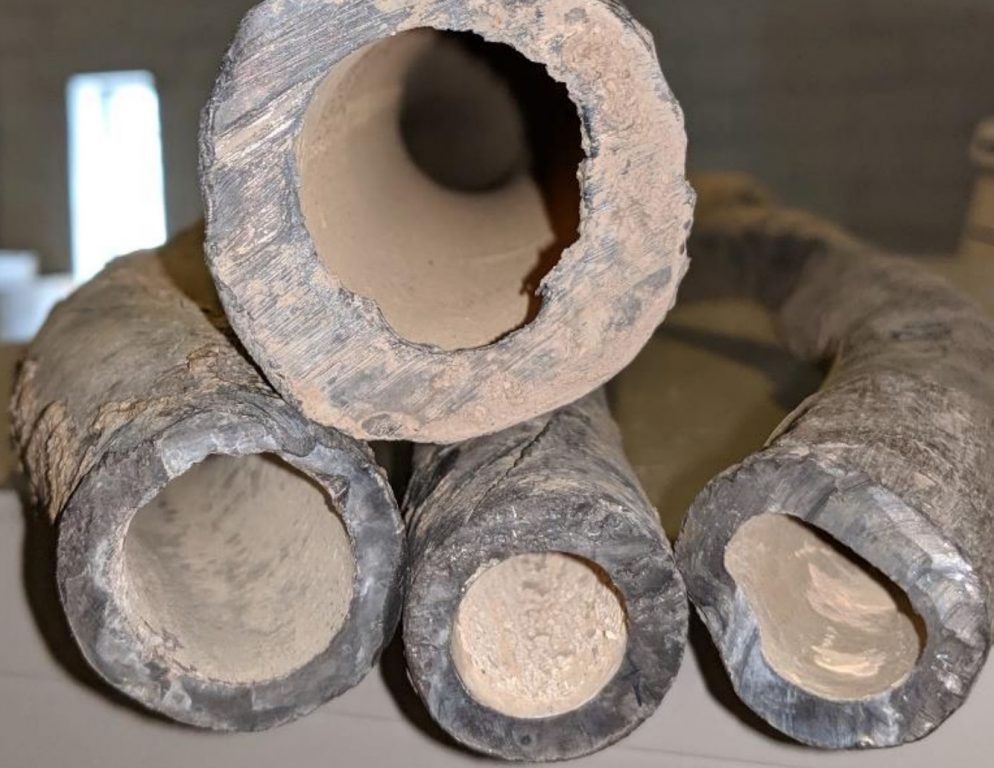Infrastructure Funds Impact Entire State
Every person, every region in state helped. Yet package divided state's congressional delegation.

Lead service lines replaced by the Milwaukee Water Works with corrosion control visible in pipe. Image from Milwaukee Water Works.
It divided Wisconsin’s Congressional delegation – all Democrats in favor and Republicans opposed – but the new $1.2 trillion infrastructure package will touch every part of the state and every resident in one way or another.
Want safer, improved Wisconsin highways and rebuilt bridges? “Wisconsin could expect to receive approximately $1.1 billion in new funding over five years – an increase of about 25%,” Transportation Secretary Craig Thompson said. “In addition, Wisconsin would receive an estimated $225 million for bridge replacement and repairs.”
“As auto manufacturers transition to producing more electric vehicles, this funding will better position Wisconsin to accommodate the increased need for electric vehicle infrastructure for motorists and businesses,” he added.
Want improved bus service in communities – Milwaukee County and Madison, especially? The infrastructure package includes $158 million more over the next five years for bus systems, according to a summary by the nonpartisan Legislative Fiscal Bureau (LFB).
“That amounts to an increase of about 30% in the first year and about 2% each subsequent year,” Thompon said.
Want Broadband expanded to rural corners of Wisconsin? Internet access is so expensive, and yet so crucial to the economic viability of those regions, that governments must subsidize it. Wisconsin could get an additional $1.1 billion more in upcoming years to expand Broadband, the Fiscal Bureau reported. Wisconsin could also get $270 million more to subsidize what Broadband costs low-income residents, and $30 million to improve access to it.
Got a neighbor or family member whose income may qualify for weatherization programs to help their home conserve energy? The infrastructure package includes $132 million more in federal aid for weatherization programs, although it is not known over how many years that aid will be distributed. By comparison, federal weatherization aid totaled $21.8 million in 2019-20; utilities contributed $56.2 million more that year.
Worried about cybersecurity? The infrastructure package would give Wisconsin $19.1 million over four years to strengthen protective systems. It would also let Wisconsin utilities apply for separate cybersecurity grants.
Worried about the increasing number of homes and businesses whose drinking water shows levels of toxic chemicals? The infrastructure package authorizes about $210 million more in federal aid over five years for clean water and safe drinking water grants, which require some state matching dollars.
And regulating PFAs — the so-called “forever chemicals” found in northeast Wisconsin, in Dane County’s lakes and other parts of the state — would be funded by $95 million for “emerging contaminants.”
Is your home, or a neighbor’s home, one of the estimated 219,000 statewide with dangerous lead-lined pipes? Infrastructure funds will give Wisconsin about $255 million — or $51 million per year for five years — to replace those lead pipes, the Fiscal Bureau estimated..
But Republican Rep. Scott Fitzgerald voted no because the package “spends only a fraction of funds on fixing roads, bridges and major projects that the American people generally consider infrastructure.”
Democrats “need to reign in their out-of-control spending,” Fitzgerald added. “The American people cannot afford the debt of their socialist agenda.”
Republican Rep. Bryan Steil explained his no vote: “We should be making investments in our nation’s infrastructure, but through a smart, targeted approach that is focused on real infrastructure. Unfortunately, this bill is not paid for, will fund Green New Deal subsidies, and only directs a small portion of spending towards improving our roads and bridges.”
Oh, and one other part of the funding: if you’re one of the 16,000 Wisconsin drivers who hit a deer last year, the infrastructure package includes $350 million through 2026 to fund new ways to decrease the number of wildlife/vehicle crashes nationwide.
Bambi must be part of our infrastructure.
Steven Walters started covering the Capitol in 1988. Contact him at stevenscotwalters@gmail.com
If you think stories like this are important, become a member of Urban Milwaukee and help support real, independent journalism. Plus you get some cool added benefits.
More about the Lead Crisis
- Gov. Evers Approves Bill to Support Lead Service Line Replacement in Superior - Gov. Tony Evers - Jul 1st, 2025
- MPS’s Westside Academy Cleared of Lead Risks After Stabilization Work - Milwaukee Public Schools - Jul 1st, 2025
- MPS Plans Lead Remediation at 40 Schools This Summer - Evan Casey - Jun 27th, 2025
- Baldwin, Reed Demand Written Answers from RFK, Jr. on Firings of Childhood Lead Poisoning Experts at CDC - U.S. Sen. Tammy Baldwin - Jun 11th, 2025
- MPS’s LaFollette School Cleared of Lead Risks After Stabilization Work - Milwaukee Public Schools - Jun 11th, 2025
- Sen. Baldwin Hears From Parents About MPS Lead Crisis, Chides RFK Jr. - Evan Casey - Jun 9th, 2025
- Reps. Margaret Arney and Darrin Madison Urge Joint Finance Committee to Reinstate Essential Lead Abatement Funding - State Rep. Margaret Arney - Jun 5th, 2025
- Gov. Evers, DHS Continue Administration’s Efforts to Combat Lead Poisoning Statewide with Permanent Rule - Gov. Tony Evers - May 27th, 2025
- RFK Jr. Claims ‘Team’ Is In Milwaukee Helping With Lead Crisis, Health Department Can’t Find Them - Nick Rommel - May 22nd, 2025
- MPS Announces Starms Early Childhood Center Is Cleared of Lead Dangers - Milwaukee Public Schools - May 21st, 2025
Read more about Lead Crisis here
More about the PFAS Problem
- Environmental Groups, Community Advocates Push for PFAS Deal - Henry Redman - Jul 14th, 2025
- Environmental Advocates Hail Wisconsin Supreme Court Decision in Evers v Marklein - Midwest Environmental Advocates - Jul 8th, 2025
- Wisconsin Supreme Court Backs State Regulators of PFAS Pollution - Danielle Kaeding and Rich Kremer - Jun 24th, 2025
- Gov. Evers Releases Statement on Wisconsin Supreme Court Decision in WMC Inc v. DNR - Gov. Tony Evers - Jun 24th, 2025
- Rep. Shelia Stubbs Elected Great Lakes-St. Lawrence Legislative Caucus Vice Chair of the Task Force on Emerging Contaminants - State Rep. Shelia Stubbs - Jun 16th, 2025
- Legislature’s Budget Committee Unanimously Boosts Clean Water Funding By $732 Million - Danielle Kaeding - Jun 6th, 2025
- Trump Administration moves to weaken standards for toxic ‘forever chemicals’ in drinking water - Clean Wisconsin - May 14th, 2025
- Wisconsin Officials Unhappy With EPA Plan To Weaken PFAS Standards - Danielle Kaeding - May 14th, 2025
- Wisconsin Could Lose $55 Million Under Proposed EPA Budget Cuts - Danielle Kaeding - May 7th, 2025
- French Island Makes Progress on PFAS Pollution - Richelle Wilson and Trevor Hook - Mar 24th, 2025
Read more about PFAS Problem here
The State of Politics
-
RNC Brings Fame to Gen Z Party Leader
 Jul 15th, 2024 by Steven Walters
Jul 15th, 2024 by Steven Walters
-
Wisconsin’s Republican Roots Run Deep
 Jul 8th, 2024 by Steven Walters
Jul 8th, 2024 by Steven Walters
-
Feuding Supreme Court Justices Need a Break
 Jul 1st, 2024 by Steven Walters
Jul 1st, 2024 by Steven Walters





















